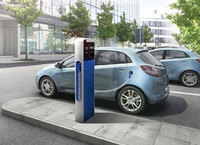Bosch technology to make vehicles more fuel-efficient

Bosch, the global supplier of technology and services, is working on gasoline and diesel engine technologies to further reduce their CO2 emissions by 20 percent, as well as electric vehicles, for which Bosch believes there will be a volume market after 2020. Bosch is therefore confident that the EU vehicle fleet emissions target of 95 grams of CO2 per kilometre is technically feasible. “We are working on innovative solutions with the aim of further improving engines across vehicle classes. Further reductions in fuel consumption are possible, but will involve considerable additional costs in some cases,” said Dr. Volkmar Denner, the chairman of the board of management of Robert Bosch GmbH with special responsibility for research and development, at the Vienna Motor Symposium 2013. “From a Bosch viewpoint, it is essential that the further development of the powertrain be regarded from a cost-benefit perspective.”
In all vehicle segments, Bosch sees technical potential for reducing CO2 emissions even further, by another 20 percent in some cases, thus protecting the environment and conserving resources. Even today, compact cars equipped with the latest technology meet the EU targets. The most advanced diesel in this segment emits just 81 grams of CO2 per kilometre. Its gasoline counterpart manages 99 grams of CO2 per kilometre. In compact cars, the emissions targets for 2020 are within striking distance, and in some cases already reality. Improvements to engines can reduce fleet vehicle values further.
For family sized vehicles, price is important. So Bosch is also working to make engines in this segment even cleaner and more efficient, but at the same time affordable. This calls for new components. For example, there are systems that can effectively recuperate braking energy, allowing a mild electrification of the powertrain. Even in the family sized class, therefore, further efforts will allow the very ambitious EU target for 2020 to be met: modern diesel engines in this class now emit 105 grams of CO2 per kilometre, and modern gasoline engines 115 grams of CO2 per kilometre.
For many vehicle manufacturers, these developments in compact and family sized vehicles make sense. The more economical a vehicle fleet's high-volume compact models are, the better they can offset the emissions from SUVs. In the premium class, simply optimising the internal-combustion engine is no longer enough for reaching CO2 targets. Additional savings can be achieved by further reducing drag and weight. At the same time, the automotive supplier Bosch is developing efficient plug-in hybrid systems that make it possible to drive up to 60 kilometres purely on electricity. Using systems such as these, even an SUV can reduce its emissions. However, this will also mean that this vehicle class will cost more. On the other hand, the plug-in hybrid offers extra functions that further enhance the premium segment. A car equipped with this powertrain is almost silent when driven electrically, but nonetheless has the same range as a car with a combustion engine. And the torque of the second, electrical powertrain provides a boost effect, making the car more fun to drive. Some 1,000 engineers at Bosch are working to electrify the powertrain and by the end of 2014, Bosch will have 30 projects in series production, with a volume market predicted to emerge after 2020.
In addition to powertrain electrification, Bosch sees potential for installing economical CNG (combined natural gas) engines in all vehicle classes. “CNG systems can already help reduce CO2 at a low additional cost. In this area, Bosch components have a technical edge,” Denner said. “However, in order to increase the market penetration of CNG vehicles, the infrastructure has to be significantly expanded.” As the world's leading automotive supplier, Bosch offers a broad range of systems and components that contribute to conserving resources and increasing energy efficiency. With sales of 31.1 billion euros in 2012, the Automotive Technology business sector accounted for 59 percent of Bosch's total sales. The business sector counts 177,000 associates worldwide, of which 33,000 are development engineers.

